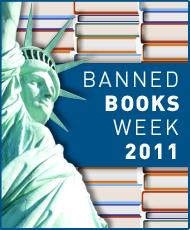
Earlier this week, that a school district in Missouri agreed to lift its ban on Slaughterhouse-Five and Twenty Boy Summer, two books the district had completely banned from its libraries. Thanks to a coalition of censorship opponents, the books are again available in Republic R-III School District libraries, but must be checked out from a "secure area" of the library by a parent or guardian.
The books were first banned in July, after Republic resident — who, incidentally, does not have children attending school in the district — sent a multipage letter to the school board outlining his religious objections to three books: Laurie Halse Anderson's Speak, Kurt Vonnegut's Slaughterhouse-Five and Sarah Ockler's Twenty Boy Summer. The Springfield News-Leader also published an op-ed by Scroggins last September: The district responded to his complaints by banning the works by Vonnegut and Ockler.
A coalition including the , the National Coalition Against Censorship and the PEN American Center to Republic School Distrcit superintendent Vern Minor objecting to this censorship in August. In addition, the ACLU of Kansas/Western Missouri filed a public records act request seeking more information about the policy that dictated the books' banning earlier this month. Community members also voiced their objections to the book bans at school board meetings.
The school board voted to reverse the ban at a school board meeting Monday. The ACLU of Kansas/Western Missouri will continue to review the district’s policies on rating, restricting, and removing books in the school district’s libraries to determine whether those policies and actions comply with the First Amendment.
This is progress, but it's also a stark reminder of the ongoing threats to artistic censorship and the First Amendment right to freedom of expression.
Saturday marks the start of , an annual event that celebrates the First Amendment and the freedom to read. New this year is Banned Sites Day on Wednesday, September 28. Banned Sites Day will raise awareness of the growing threat of internet filters to students' free speech rights. (The ACLU has been very active fighting censorship via internet filters with its "Don't Filter Me!" campaign.) As the American Library Association points out on its Banned Sites Awareness Day page:
Filtering websites does the next generation of digital citizens a disservice. Students must develop skills to evaluate information from all types of sources in multiple formats, including the Internet. Relying solely on filters does not teach young citizens how to be savvy searchers or how to evaluate the accuracy of information.
Of course, we at the ACLU heart Banned Books Week. ACLU affiliates across the country, from Connecticut to Texas, are celebrating the freedom to read with an array of events, from readings, to panel discussions, to parties. Check out a comprehensive list of ACLU events in your state here.
We hope you'll join us next week: Read a banned book or browse a banned site (), and let's celebrate the First Amendment!
Learn more about censorship: Sign up for breaking news alerts, , and .


